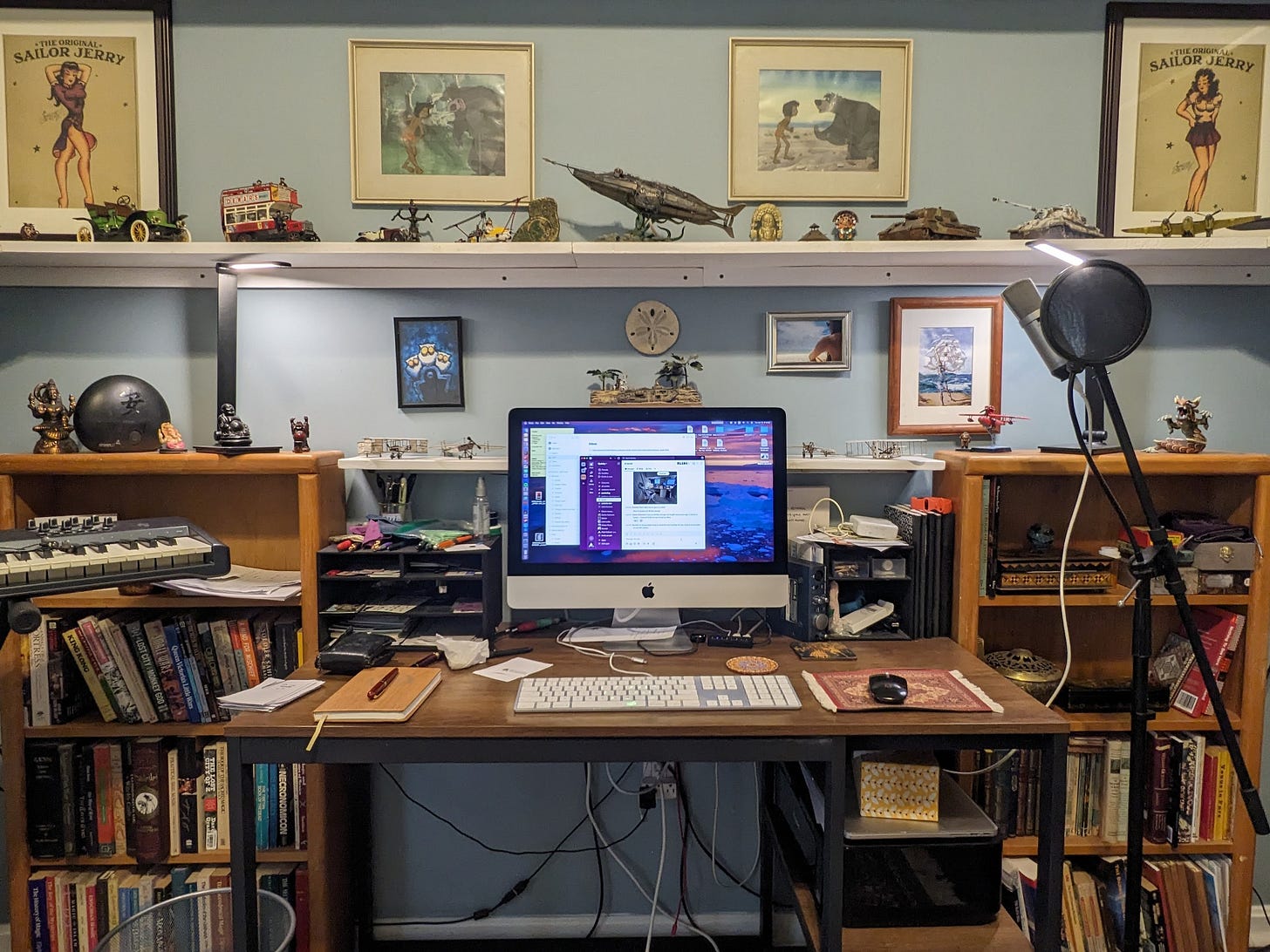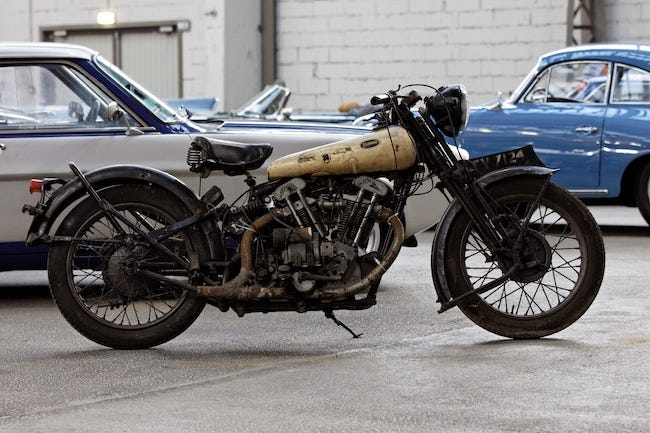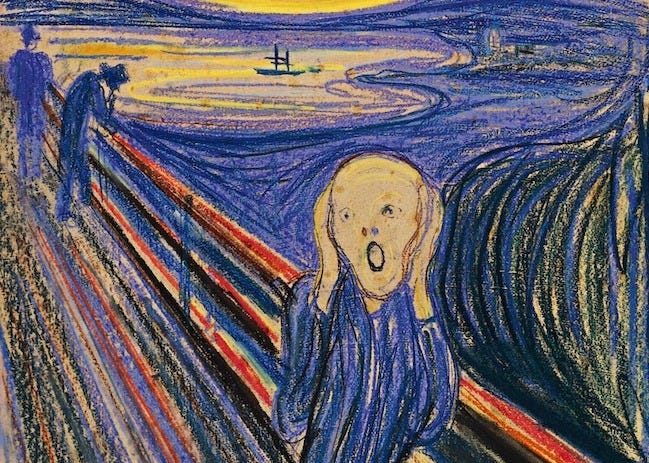My minimalist library
I used to be a book hoarder. Now I have fewer books, but I love them more than ever.
Trigger warning: contains scenes of bibliocide.
Forty-odd years ago, I went to a bike rally. (I don’t remember which one: it’s not important.) In the exhibition area, there were hundreds of vintage motorcycles, most in absolutely pristine condition: perfectly restored, carefully maintained, and as good as the day they came out of the factory. I was enthralled and started snapping pics of Vincents, Triumphs, Broughs, and more. But the friend I was with, a Hells Angel, pointed me at a beaten-up, filthy Brough Superior with scratched up footpegs, rust on the exhaust, and worn tyres. “That’s the one you should be taking a photo of,” he said with admiration.
I didn’t get it. Why that one?
“Because,” he explained, “that one gets ridden, and ridden hard. It probably got ridden here, not brought here on a trailer. Someone actually treats it like George Brough would have wanted, and that deserves respect. It’s not a museum piece. These other bikes… they’re pretty, but they’re just for showing off.” (Actually, he probably said it with a lot more f-bombs, but you get the idea.)
Something in that hit me hard. Things aren’t made to be owned: they’re made to be used. If you own something and don’t use it, what’s the point in having them?
Obviously, of course, there are exceptions. Art, for example, isn’t there to be used, so collecting art is fine, right? But arguably, the purpose of art is to be looked at, so if you’re looking at your art collection and not squirreling it away in a vault, it is fulfilling its purpose. (Hold that thought, I’ll be coming back to it.)
And… books. Owning books is great. The more you own, the better, right?
When I lived in England, I amassed a huge collection of books. I bought thousands of books from second-hand bookstores, market stalls, and anywhere I could. I inherited thousands more from my great-uncles and other family members. I had a five-bedroom house, in which every room was filled with books. There were bookcases in the hallways and on the landings, and boxes of books in the attic. I literally had more books in my home than the local library.
And the thing I found hardest to admit was that I would probably never, ever read a single one of the books on my shelves. To be fair, I had read every book I’d bought, other than a small-ish to-be-read pile, but the chances of me re-reading any of them were slight. And all those ones I’d inherited? I’d probably never even open them. I didn’t even know what I had: I just had a house full of books, because that’s what well-read middle-class people like me aspired to.
There was a time when I believed, like Umberto Eco, that simply surrounding myself with books was more important than actually reading them. Somehow, the knowledge would trickle into my brain by osmosis.
Read books are far less valuable than unread ones. [Your] library should contain as much of what you do not know as your financial means, mortgage rates, and the currently tight real-estate market allows you to put there. You will accumulate more knowledge and more books as you grow older, and the growing number of unread books on the shelves will look at you menacingly. Indeed, the more you know, the larger the rows of unread books. (Big Think, August 2025)
In other words, there’s no need to read Gibbon’s History of the Decline and Fall of the Roman Empire or Darwin’s Origin of the Species or Milton’s Paradise Regained, or all the novels of Dickens or Asimov or the poetry of Spike Milligan. Just acquire the books, put them on your shelves, and take comfort in knowing that if you ever wanted to spend the time to actually read them some day, you could. That’s like buying gym equipment and thinking it’s going to make you fit.
To me, it’s just hoarding. That’s not a repository of knowledge. It’s a vast pool of untapped wealth filled with books that you have no intention of reading. You just like looking at the spines - or knowing that other people are looking at the spines. You’re no different to J.P. Morgan or some aristocrat with a giant book collection so you can feel smart.
My sister and van Gogh
Let’s step back to that art analogy. Prepare to be horrified.
A long time ago, a family friend, Christopher, took my little sister, Abi, to an exhibition of van Gogh. She was about eight or nine years old, and she loved it. On the way out, she found a large coffee table book of about fifty of his paintings. It wasn’t cheap, but he offered to buy it for her on one condition.
He also bought her four picture frames, and told her to slice every single page out of the book. Then each month, she was to pick four pictures and put them on her bedroom wall. It would take her about a year to get through them all. So she did.
Abi adored those pictures. She knew the story behind each one. I’ve never known a kid that age who was so fascinated by post-Impressionist art. Where other girls had Disney and horses and fairies on their walls, she had not just Van Gogh but Manet, Monet, Seurat, and more. And those four frames of rotating van Goghs went with her everywhere she lived, for her entire life.
Slicing books up sounds heretical, but she got more use and value out of that book than she would have done if she’d just put it on her shelf. As Christopher said, if you have the book, it’ll just be another spine in your collection. You’ll probably never look at it again after this week. But this way, it’ll truly mean something to you, and you’ll be able to enjoy it every day.
Can’t really argue with that. In fact, as I write these words, I’m beginning to feel guilty about my books of Leonardo, Chris Achilleos, and Weird Tales cover artwork. Maybe they’d be better as wall decor than shelf fillers… where’s my scalpel? I’m sure I’ve got some unused frames in the garage and I’m sure Della won’t mind me redecorating the bedroom…
Less is more, even with books
When I moved to the USA, I left almost all of my books behind. Shipping them would have been prohibitively expensive, so I kept only the most precious, fewer than a couple of hundred out of close to twenty thousand. The rest were sold, donated, or otherwise disposed of.
Selling them wasn’t easy. Nobody was interested in most of them - certainly not interested enough to buy them. A few second-hand book dealers came over and cherry-picked a few of the rarities, but they weren’t even interested in taking the rest for free. (Can’t say I blame them - I can’t imagine who would want to read a lot of them, let alone pay money for them.) In the end, the local library got almost all of them. I have no idea what they did with them. A couple of thousand literally ended up in the dump because not even the library was prepared to take them. That hurt, but there wasn’t any other choice.
Today, I have just four bookshelves. Two of them are either side of the desk in my office. The third, a little larger, houses my graphic novels, the oversize hardbacks (including the aforementioned coffee table books about art) and my to-be-read pile, which currently stands at six, count’em, six books. And those shelves aren’t even filled with books: they’ve got models, decks of cards, notebooks, user manuals, ornaments and other things on there as well. There’s also a small shelf downstairs that houses my cookbooks, and my entire collection of DVDs and video games.
Yes, those too. I used to own thousands of movies on VHS, DVD, and Blu-Ray. And thousands of records, cassettes, and CDs, as well as every videogame or board game I’d ever played. Not that I had a video recorder, cassette deck, record player, PC, PS1, MegaDrive or whatever, but that wasn’t the point. I had stuff, just in case I ever had an irrepressible desire to replay The Simpsons Skateboarding or watch Atlas in the Land of the Cyclops or listen to Second Sighting by Frehley’s Comet. (Actually, I’m not sure I got all the way through listening to that one even once - but it was there if I ever wanted to try again.) They all went as well. At least I managed to sell those: the music, games and movie collection paid for the immigration lawyer and my US residency application. Seemed like a fair trade.

Every book I own meets at least one of the following criteria:
That specific book has meaning to me, and is an irreplaceable part of my memory. Another copy of the book wouldn’t be the same, even if it’s the same edition. For example, the books I won as school prizes. My signed copies of Alan Moore’s Watchmen and George R.R. Martin’s The Armageddon Rag. The Narnia books I’ve owned since I was six and have read until they’re falling apart. The encyclopedias of mythology my mum gave me when I was ten. My uncle’s copy of Barbarella from the 1960s, predating the movie. The Arkham House collection of Clark Ashton Smith stories with illustrations by J. K. Potter, which includes a mutated photograph of me. The volume of Jim Morrison’s poetry I spent years tracking down when I was a teenager and eventually found in a bookshop in Brattleboro on my first visit to the US. In many ways, those aren’t books, per se. They’re totemic objects that just happen to have the form of books. By and large, they’re the books I brought from England. Very few of the books I’ve acquired since fit into that category.
I actively intend to read that book in the next few years. If I’m keeping it, it’s because I plan to make use of it. Effectively, the rest of my collection is my extended to-be-reread pile. They’re not there because I have read them, they’re there because I’m going to read them. Given that I probably have about fifteen years left to me, I need to be realistic about how many books I can get through in that time. And since a lot of what I read will be first-time reads, I’m only going to have limited time for re-reads. Even so, I can probably acquire anything I want to re-read from my local library or AbeBooks - there’s no need to keep something on my shelves unless it’s particularly obscure or expensive.
These days, I don’t keep the majority of the books I read even if I like them. Unless I’m sure I’m going to read them again, I generally donate them to the library or one of the charities once I’ve finished them. And if truth be told, I don’t buy many books these days: I get almost all of my reading from the library.
I know many of you - probably most - will be appalled by this. Cutting up books, disposing of books, not being surrounded by books - it’s just wrong! But I believe that it’s deepened the meaning that my book collection has to me. Every single one of those books is a unique, treasured possession. It’s more than a spine on a shelf. It’s more than a physical record of what I’ve read. It’s something I use, enjoy, and, most importantly, actually read.




Lovely essay, Matt. I disagree a bit because I just like having books around me. Good for my mental health, but I take your points. I have a roommate who fills his bookshelves he is never going to read. I call them "Show books" because they are there to impress someone looking through their books. All of my books are there for a reason and I do intend to read them except for books I've purchased to resell. That's my two cents.
I must say after having started moving your mum's books to somewhere they'd be appreciated I have been regularly getting rid of books; some via World of Books and some via a charity table in our supermarket. And like you I keep only those I will read or those that have memories. It is why I love the library because I can read and then give back. Also I am finding that, even though we are in a big house and could have loads of stuff I am culling slowly.
And the story about Abi and the art book reminded me of my kids - aged about 7 and 10 going round the impressionists part of the Muse d'Orsay, Paris, saying "we've got that one on our fridge" "and that one" "but not that one" and then giving the found one a good look, all because your mum had given us a calendar of Impressionist paintings which we'd cut out and put on the fridge. They also would go round the Tate Modern not being shy about asking things like "why is that there?" when they didn't think it was that great.